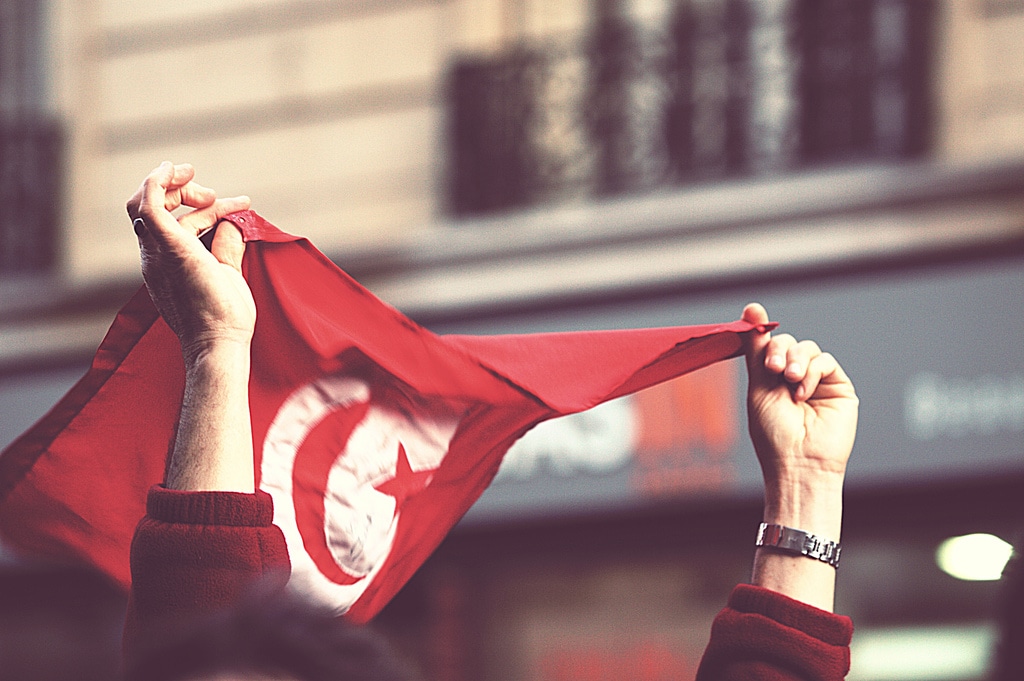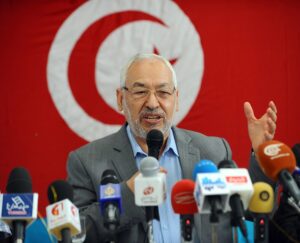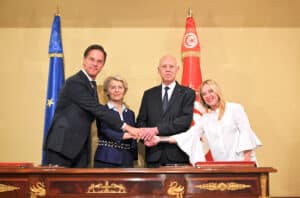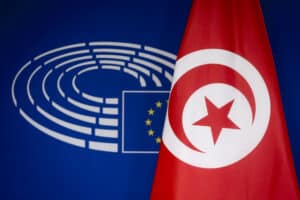Over the last week, several violent demonstrations have been sweeping Tunisian cities over increased prices, taxes and high unemployment. In Tunisia’s capital Tunis and in the town of Tebourba, police fired teargas to disperse the protesters. So far, around 800 protesters – most of them youths around the 20s – have been arrested for acts of violence and vandalism. One person, who had had chronic breathing problems, died after inhaling teargas.
On 14 January – the seventh anniversary of Tunisia’s long-time ruler Ben Ali’s fall – violent protests took place in the Kram and Ettadamen districts of Tunis, where demonstrators threw stones at police cars. Some hours before the protests, President Beji Caid Essebsi had visited a youth centre in Tunis’s suburb of Ettadamen aimed at soothing tensions in the area. In the city of Feriana near the Algerian border, people had been trying to cut off the roads, but failed as they were chased away by policemen. On 13 January, a rally took place in front of the Labour Union (UGTT) headquarters. In the city of Sidi Bouzid, university graduates had been shouting slogans and holding placards outside a government building, calling on the government to give them jobs.
Disappointment and anger
The austerity measures have sparked public anger and frustration over the deepening economic hardship since 2011. Which started as a small and spontaneous movement on 8 January, continued to spread across the country the days after.
Although most of the protests have been peaceful, demonstrations are increasingly turning into violent riots. In 20 cities, the police clashed with protesters, as they attacked police stations, government buildings and torched cars. The most violent riots took place in the night of 10 January, as army forces were sent to the city of Thala, near the Algerian border, in order to choke the masses that had set the national security headquarters of the region on fire forcing the police to retreat. 330 people allegedly ‘’involved in acts of sabotage and robbery’’ were arrested during that night, the Interior Ministry’s spokesman Khelifa Chibani said in a statement. Among those detained were also two radical Islamists. In the daytime, a Jewish school was hit by petrol bombs during protests against austerity measures in the tourist resort island of Djerba, though locals said unknown assailants had taken opportunity of the demonstrations to attack the school, as there was a reduced security presence. The government has deployed 2,100 soldiers in several other towns, including Kebeli, Bizerte and Sousse, in order to protect government buildings and get grip on the situation.
National and international reactions
The Ennahda party, one of the ruling coalition parties, called for an increase of the minimum monthly wage to 357 dinars (143 dollars) and for more aid for poor families. Nourredine Taboubi, head of the labour union UGTT, also demanded the minimum wage and aid for the poor to be raised. Fatma, a market woman, endorses Taboubi’s call. ‘’At the time of Ben Ali, which we did not like, I filled my stand with vegetables, fruits and other items with 10 dinars, and now 50 dinars do not fill this gap. The situation has worsened dramatically (…) The government is sacrificing the poor and the middle class by raising prices and ignoring tax evaders and businessmen.’’
Tunisia’s Prime Minister Youssef Chahed called for calm, saying the economic situation would improve this year. ‘’People have to understand that the situation is extraordinary and their country is having difficulties, but we believe that 2018 will be the last difficult year for the Tunisians.’’ Regarding the calls for an increase of the minimum monthly wage, the government pledged it will increase the aid for 250,000 poor families by 170 million dinars (70 million dollars).
However, the Tunisian government said that it does not intend to waive the measures aimed at improving the poor economy and satisfying international lenders, including the International Monetary Fund (IMF), with which the government agreed a four-year loan programme worth 2.8 billion dollars in return for economic reforms. ‘’The government will not revise the budget or even some of its articles because some troublemakers have come out in the street,’’ Investment Minister Zied Ladhari said.
The UN High Commissioner for Human Rights, Navi Pillay, urged the Tunisian government to curb the use of ‘’excessive force’’ against its citizens. Pillay also said that the ‘’human rights defenders and bloggers, arrested solely for their peaceful activities, must be released immediately.’’
‘’We’re concerned about the high number of arrests, some 778 people we understand have now been arrested since Monday, and around a third of those arrested were between the ages of 15 and 20 so very young,’’ UN Human Rights spokesman Rupert Colville added.
Criminal elements?
According to the government, the disturbances are driven by criminal forces. ‘’What is happening is crime, not protests. They steal, intimidate people and threaten private and public property,’’ the Interior Ministry’s spokesman Khelifa Chibani said. ‘’What happened is violence that we cannot accept. The state will remain steadfast,’’ PM Chased said after visiting towns hit by the riots.
Some witnesses argue that it is not only troublemakers who are behind the riots. ‘’It is true that some protesters burned and stole during last night’s protests, but the rulers steal and destroy Tunisia in the morning and at night with their frustrating decisions (…)We expected things to improve after Ben Ali was ousted, but it seems that after seven years of the revolution, we’ll give our salaries each month to Prime Minister Chahed for him to spend them,’’ said teacher Mohamed, who did not want to give his real name due to security reasons.
Prime Minister Youssef Chahed has accused the opposition of inciting unrest and calling for more protests. The demonstrations erupted only after #FechNetannew – ‘What are you waiting for?’ in Arabic went viral on social media. Sources say this movement was instigated by the populist Popular Front (PF), a coalition of left opposition parties, though party channels were not used. Members of the PF also marched in last week’s protests. Three local leaders of the party were arrested for allegedly setting a government building on fire, a judicial source said. According to the main opposition bloc, its leaders are targeted in a political campaign that was ‘’reproducing the methods of the oppressive Ben Ali regime.’’ The PF called for new protests as well as parliamentary elections as a result of the failure of the government to resolve the deep-rooted problems.
Ennahda’s party leader, Sheikh Rached Ghannounchi, has said in a statement that the recent demonstrations against the 2018 budget is a “cynical electoral move” and links it to the announcement of the date of the local elections, set for the 6th of May. “This means that each party is creating distance from each other. They criticizing each other and promote themselves. Opposition parties which want to take advantage of the difficult social situation just to oppose the government, which explains why they oppose the budget, despite the fact that they themselves have discussed and passed in parliament.”
More protests lying ahead
It seems the social unrest will not come to end yet, as more and more people have been protesting against the austerity measures, which the government does not want to relinquish, despite its promise to give more money to poor families. ‘’We have only won the freedom of expression after the 2011 revolution … but we will remain in the streets until we win our economic rights just as we have our freedom,’’ one protester said.
Scattered dreams
After the ousting of long-time ruler Zine El-Abidine Ben Ali in 2011, the Tunisian people had hoped the economic situation in the country would be improved. The opposite happened, however. The Arab Spring uprising followed by terrorist bombings in 2015 drove away foreign investors and damaged the tourism sector, which accounts for eight per cent of Tunisia’s revenues. In addition, the country has had nine governments since Ben Ali’s fall, which did not benefit its poor economic state either.
State statistics show the trade deficit has been widening up to 15.592 billion dinars (6.25 billion dollars), whereas the annual inflation rate had been rising to 6.4 per cent in December. The dinar currency fell to 3,011 vs. one euro on 8 January. ‘’The sharp decline of the dinar threatens to deepen the trade deficit and make debt service payments tighter, which will increase Tunisia’s financial difficulties,’’ Tunisian financial risk expert Mourad Hattab said. A weak currency could further drive up the costs of imported foods.
Despite Tunisia is regarded as one of the success stories of the Arabic Spring revolts, none of the nine governments has been able to resolve the lingering social-economic problems. The national unemployment is currently estimated at 15 per cent. Some policies made the situation even worse. Last year, the ruling coalition – consisted of the Islamist Ennahda Movement and the secular Nidaa Tounes – decided to increase prices for fuel and some goods and services by 1 January, as envisioned in the 2018 budget, which was adopted in December. The austerity measures also include tax increases, such as customs levies on imports upon which the country strongly depends, and taxes on cars, phone calls, Internet usage and hotel accommodations. In addition, the government has been trying to cut the state’s wage bill through voluntary redundancies to public service workers, downsizing it to 12.5 per cent by 2020. The government defends the measures as necessary to limit the budget deficit.
Sources: Reuters Reuters I Al Arabiya Al Arabiya I Al Arabiya II Al Arabiya III Al Arabiya IV Reuters II Reuters III Al Jazeera Reuters IV Reuters V Reuters VI Reuters VII Radiofree Europe VIII Al Jazeera I Al Jazeera II



